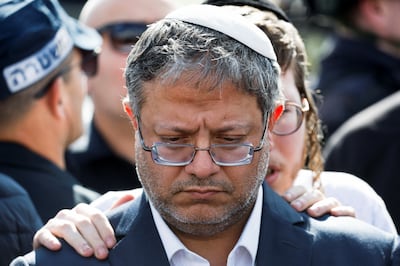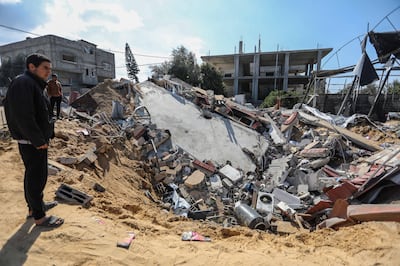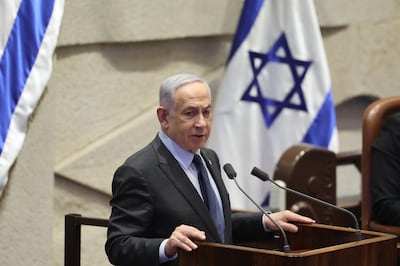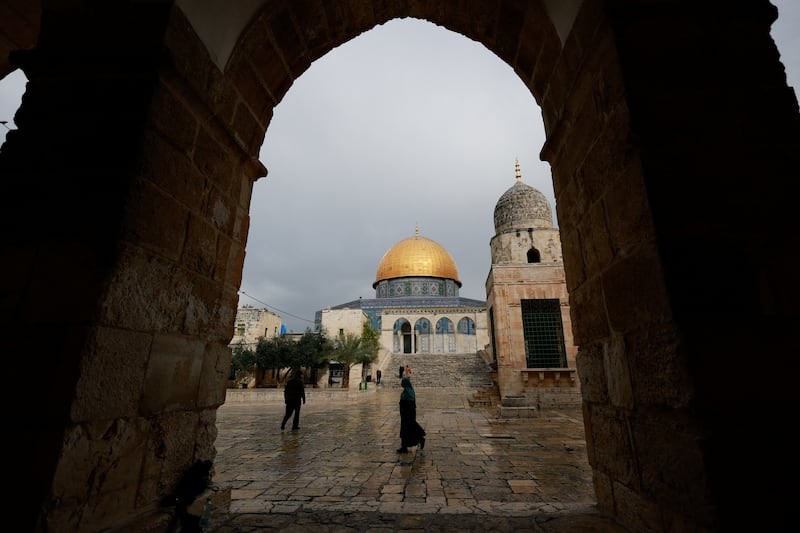Live updates: Follow the latest news on Israel-Gaza
Politicians in Israel are sounding the alarm as reports mount that the country’s far-right government will impose strict limits on worship at Jerusalem’s Al Aqsa Mosque over Ramadan, which risks increasing already critical tensions in the region amid the Gaza war.
The warnings come after a spate of Israeli media reports on Sunday that Prime Minister Benjamin Netanyahu is set to accept severe restrictions on Muslim prayer at Al Aqsa, the third holiest site in Islam.
The reports say that the draft rules have been proposed by far-right National Security Minister Itamar Ben-Gvir, who has a history of anti-Arab incitement, and has been linked to a defunct extremist organisation Kach. The group was linked to terrorist attacks on Arabs and left-wing Israelis before being banned in Israel in 1994.
“Netanyahu and Ben-Gvir are aware of how sensitive Al Aqsa is in the Middle East. They are trying to burn things to the ground to stay in power,” Arab-Israeli political leader Sami Abu Shehadeh told The National on Tuesday.
“All Israeli decision-making since October 7 has been irrational. Logically, it is really easy to prevent violence over Ramadan: just allow people to pray,” he added.
Sunday’s reports, which were featured by a number of leading Israeli newspapers and TV stations, suggest Mr Ben-Gvir is proposing to limit access to the compound to those at least above the age of 60.

That would revive a similar policy put in place after October 7, which authorities recently relaxed.
The Israeli Prime Minister’s office subsequently issued a vague counter-statement that promised a “balanced decision that allows freedom of religion with necessary security limits, which have been set by professional officials”.
There is still a total ban on West Bank Palestinians entering Israel and East and West Jerusalem.
Mr Ben-Gvir’s reported plans would, however, also prevent large numbers of Palestinian citizens of Israel and Jerusalem Palestinians from praying at Al Aqsa.
Abdulazim Salhab, head of the Jerusalem Endowments Council, which is a division of the Jordanian government, warned of the possibility of “the situation exploding” as a result of the reported Israeli actions.
“It is the right of every Muslim to come and pray in the holy Al Aqsa Mosque,” Mr Salhab told official Jordanian television.
“Security cannot be an excuse. Putting age restrictions is totally rejected,” he said.
Israeli policy towards Al Aqsa is a frequent cause of violence with Palestinians.

Hamas, which Israel is fighting in the Gaza Strip after the group launched the October 7 attacks in southern Israel, called its unprecedented assault Operation Al Aqsa Floods.
Israeli Labour Party leader Merav Michaeli told The National such restrictions will significantly escalate tensions, leading to a “religious war”.
“This is my worry,” she said.
“Instead of building a better future here, we are ruining not only our present but also the longer-term prospects.
“My worry is that things will escalate and I cannot defend my government in that sense at all. Nor can I defend those who are escalating and inciting on the other side. Unfortunately, extremists on both sides are doing very well together.”
Mr Abu Shehadeh says Mr Ben-Gvir’s approach is part of a deliberate attempt to impose total Israeli control over Jerusalem.
“They want to tell Palestinians, Jordan and the Islamic world that Israel is the sovereign power in occupied east Jerusalem,” he said.
“With such a mentality, things can easily explode in Jerusalem and all over. As a Palestinian leader, I can tell you we are tired of war. We pray this war will be the last for us. The current extreme fascist Israeli government sees otherwise.”
Mr Salhab also described the Israeli plans as “aggression against the Hashemite custodianship”.
Al Aqsa is of special importance to Jordan, because the Hashemite monarchy claims custodianship over the mosque and other holy sites there.
The US is also discussing with its Middle East allies a possible resumption of Palestinian-Israeli peace talks after an end to the Gaza war.
A central issue in such a scenario would be the mosque, which was captured by Israel from Jordan in 1967, together with the rest of East Jerusalem.
The Hashemite claim over Al Aqsa dates to Sharif Hussein Bin Ali, a great-grandfather of King Abdullah.

In 1924, Palestinian religious leaders gave Sharif Hussein custodianship over Al Aqsa, after he played a major role in raising funds to renovate the shrine.
The 1994 Jordanian-Israeli peace treaty does not mention custodianship but says that “Israel respects the present special role of the Hashemite Kingdom of Jordan in Muslim Holy shrines in Jerusalem”.
“When negotiations on the permanent status will take place, Israel will give high priority to the Jordanian historic role in these shrines,” the treaty says.
In May 2021, violence at Al Aqsa helped spark an 11-day war between Hamas and Israel. Extremist Jews have continued entering the mosque, prompting sporadic clashes between Israeli security forces and Palestinians.
Mr Ben-Gvir has entered the compound three times in his ministerial career, drawing intense international criticism.






